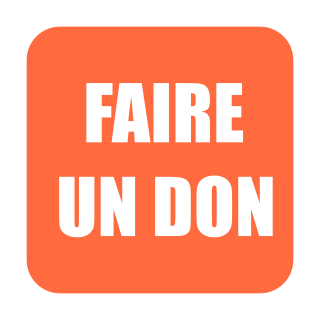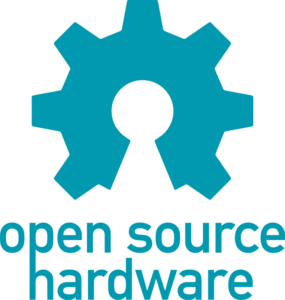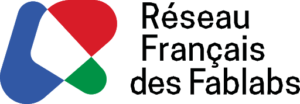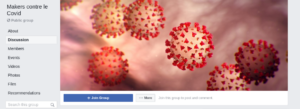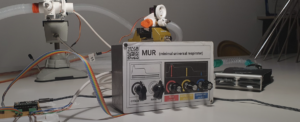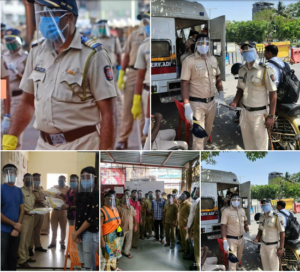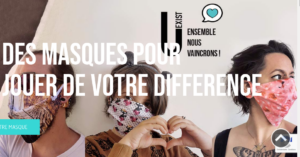It is vital to share knowledge in times of crisis and it is a logical reaction for human beings to help each other when everything is going badly. This mindset is natural in communities working for the common goods and COVID-19 shows the extent to which collaborations allow the creation of effective and affordable solutions. As a relevant example, following the Fukushima disaster, a low-cost open source electronic device had been collaboratively developed in an emergency by a network of ingenious volunteers. It enabled people with limited financial resources to test areas of radioactivity. Its name : Safecast : An open source Geiger counter.
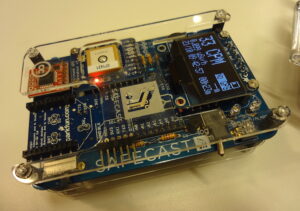
Safecast : open source DIY Geiger counter for Fukushima
With COVID-19, history repeats itself: sewing tutorials to make masks, blueprints of visor arches, hooks for door handles available freely to download and 3D print.
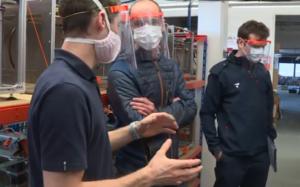
Protective visors: the arch is 3D printed
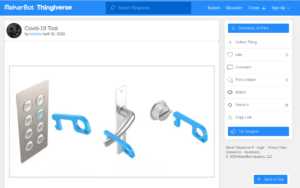
3D printable door hooks
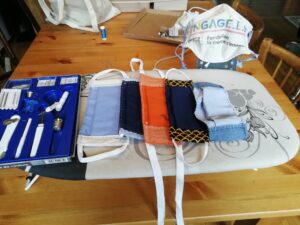
Home-made masks distributed to local artisans
The late response of the government has generated solidarity, these technical inventions are a good example of this solidarity. We of course hope that the open source project of a low-cost COVID-19 detection kit will soon see the light of day. Much more complex and revealing of collective intelligence, MakAir, is an open source respirator, developed in four weeks by researchers and makers from different backgrounds.
Open source ?
That is to say, a project with open, accessible, reproducible, modifiable source files to which is attributed a CreativeCommons license granting rights to the author of the creation. Open source hardware projects that bring together a wide range of researchers (makers, engineers, students, volunteers, relevant people) are inclusive, notably in terms of intellectual property, which becomes shared instead of private, isn’t fantastic ?
And while the French Fablabs network (RFF) collects open data information and projects, Github allows you to participate as a developer.
All this is perhaps slightly too technical, the video below summarizes in 20 minutes how the makers have organized themselves since the beginning of the lockdown. Working groups, conception, prototyping, errors, testing, try-outs… Thank you Mr Bidouille for this excellent video.
https://www.youtube.com/watch?v=lnM7UVT2i-o&feature=youtu.be
The situation of crisis reveals not only the intrinsic generosity of human beings, but also enhances the stimulation of cooperation networks as well as the development of tools aimed at the common goods.
Examples ?
The Facebook groups Makers Against COVID, created by department, allow to identify the demand for masks (caregivers, artisans, private individuals) to manufacture them locally and to distribute them for free via volunteers. 100 000 visors produced thanks to 3D printing, involvement of 5000 volunteer makers, 100 fablabs as reported by the media Makery. From city to village, solidarity has proven itself again and this is only the beginning!
My Human Kit has joined the departmental network Makers against Covid 35 to whom we provide visor supports. The network is in charge of distributing them via its volunteers. At the time of writing this, the demand has fortunately decreased.

3D printed visor supports that attach to the head
What about the Humanlab network ?
In France
- The La Petite Lande middle school in Rezé (44) is unable to organize the annual solidarity race and offers to make a donation to support the Humanlab Africa project.
- The APAJH44 in Nantes manufactures and distributes visors.
- Benoit of the Palavas Les Flots Humanlab is involved in the low tech respirator project MUR.
Worldwild
- Frugality at the Senfablab in Dakar, Aissatou and Arame, two makers of sixteen and seventeen years old manufactured an automatic hand washing system, well done girls (and it was on the news, see below) !
- Meanwhile,the Makers Asylum in India manufactures and distributes visors to Mumbai police officers.
Companies of our network
- Printing and distribution of protective visors via the Facebook group Shields – visieresolidaire – Covid19 – 44 of which Orthopus, a company from Nantes, is a member of.
- Same for SLS in Rennes who is a member of the united companies in Brittany and insists on the fact that the open source is an essential alternative for the future.
- U-Exist, a start-up company from Lille specializing in prosthesis customization offers the distance selling of masks that they manufacture themselves with a little additional fashion touch to add style.
The AFNOR (Association Française de Normalisation or French Standardization Association) has put a guide of requirements online to manufacture barrier masks. Here are a few examples of initiatives in France : Entrainde Maker France, Open source against covid 19, Fabricommuns, Covid3D, Covid initiatives, 3D4 care, pole EMC2….you will finf probably more on the net.
Conclusion
In these times of crisis, we rediscover that sharing and mutual aid, even if they are now exacerbated, are as a matter of a fact constitutive of our human condition. Let us think about the future, with the economic difficulties that will emerge, particularly and as always, for the weakest.
Even if it is unlikely that the bright days we all dream of are coming as of yet, it shall perhaps be the opportunity to evolve, not towards competition, but rather emulation. If we know how to show solidarity against the virus, we will also know how to do so for the challenges that lie ahead, when it comes to environmental matters for example.
If you are a maker, member of a fablab, you might know some of these links for mutual aid using the open source as a means of creativity against COVID-19
Let us share, develop and apply knowledge, because knowledge is a weapon against ignorance.

